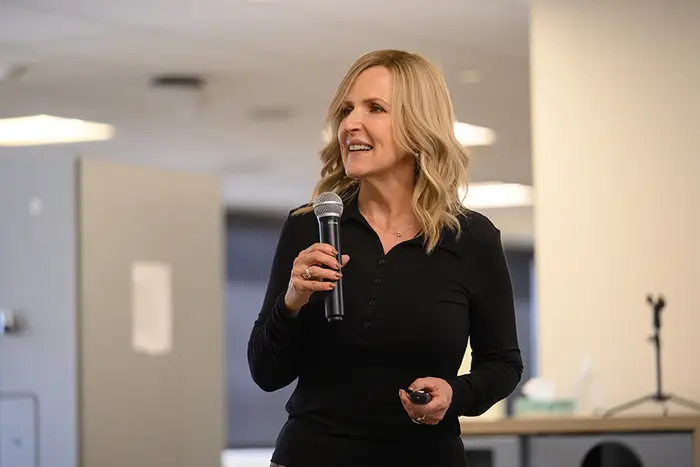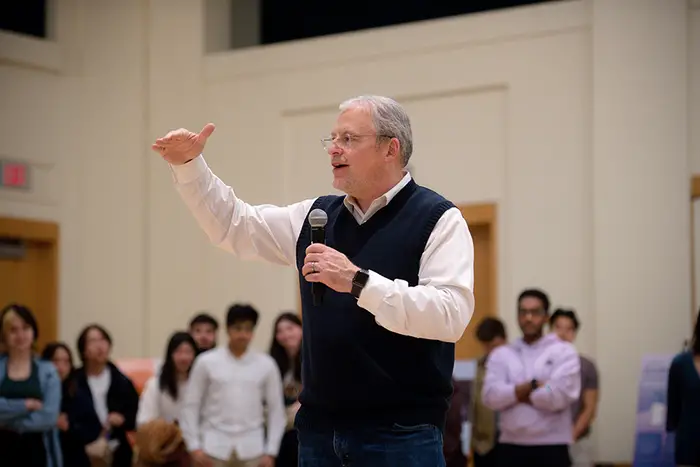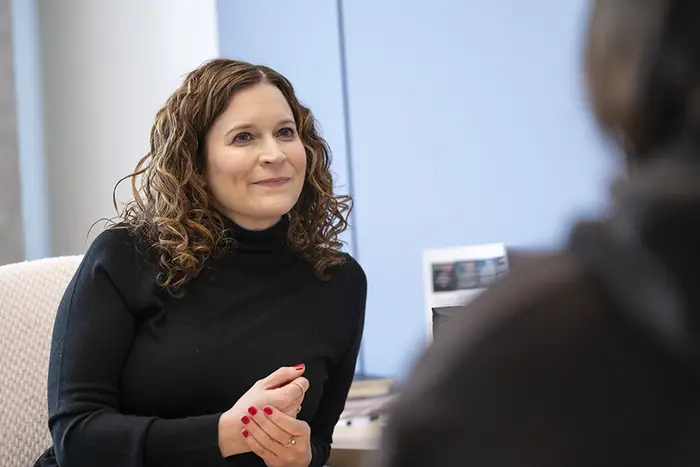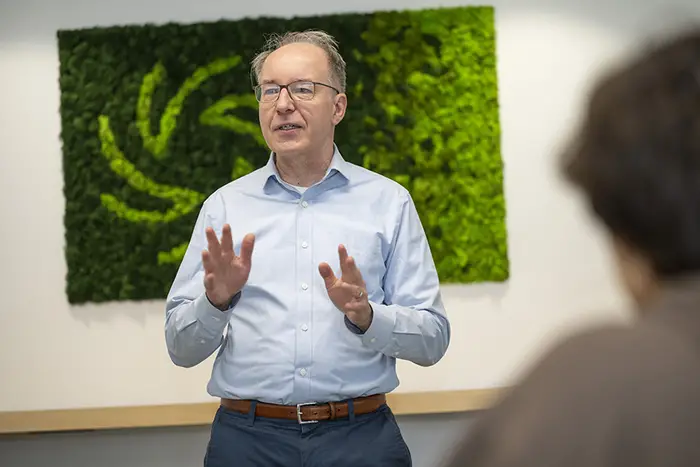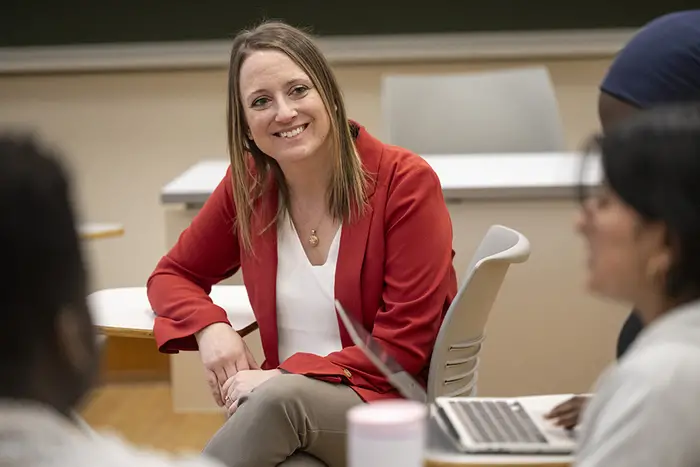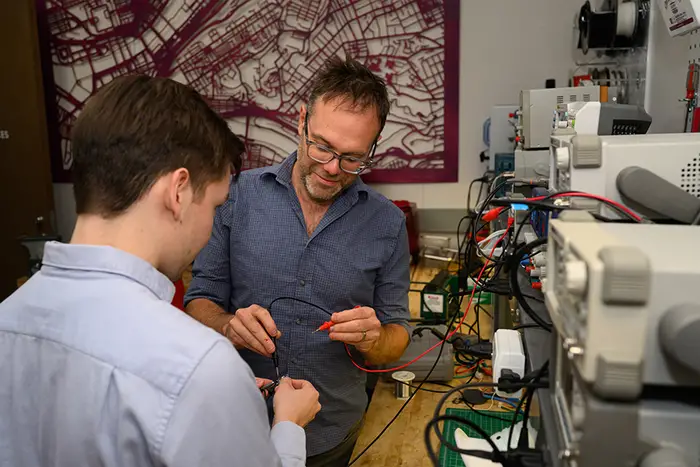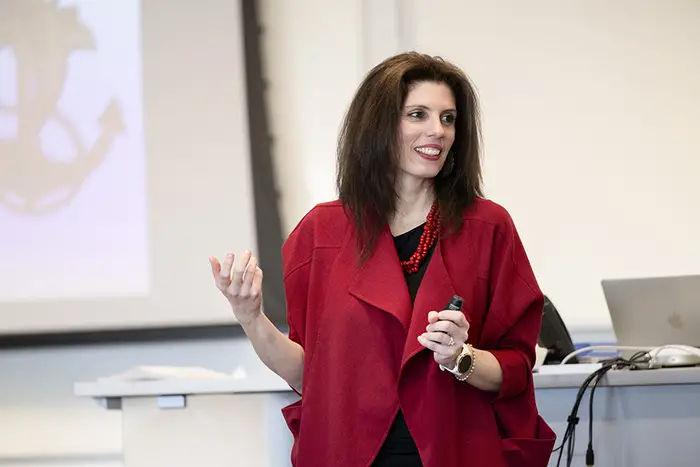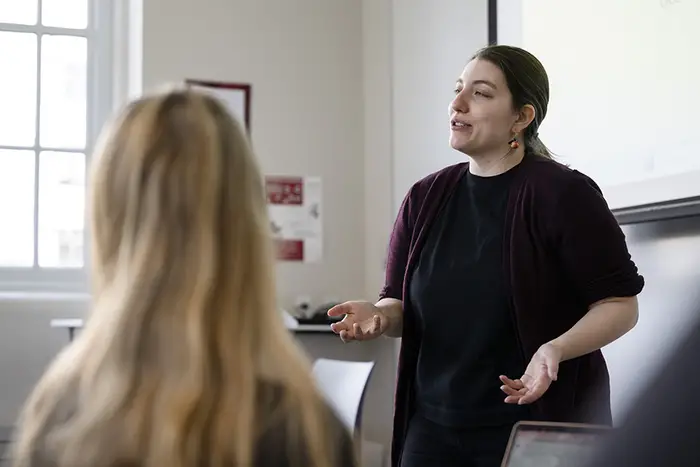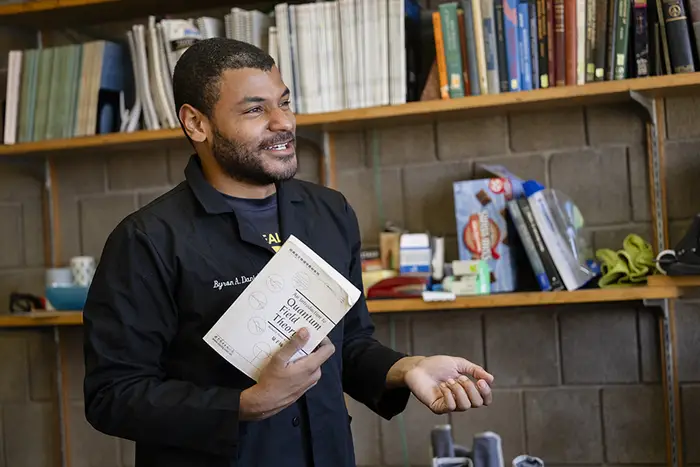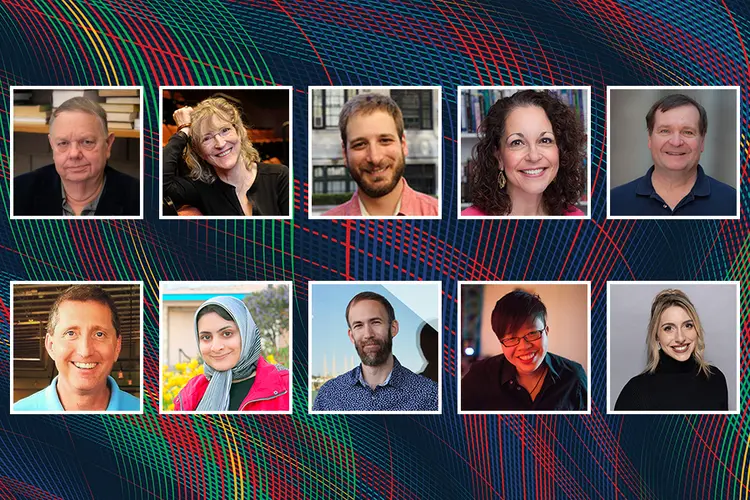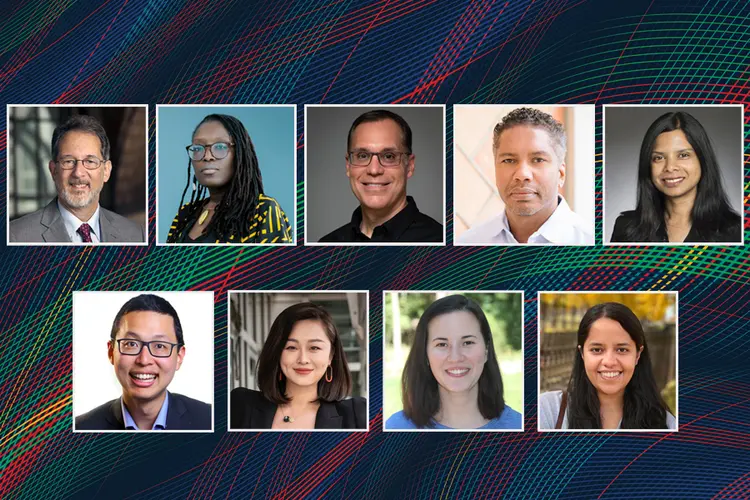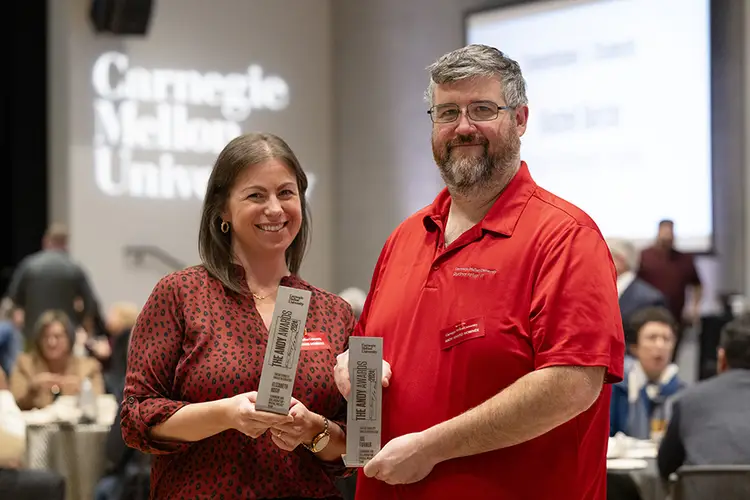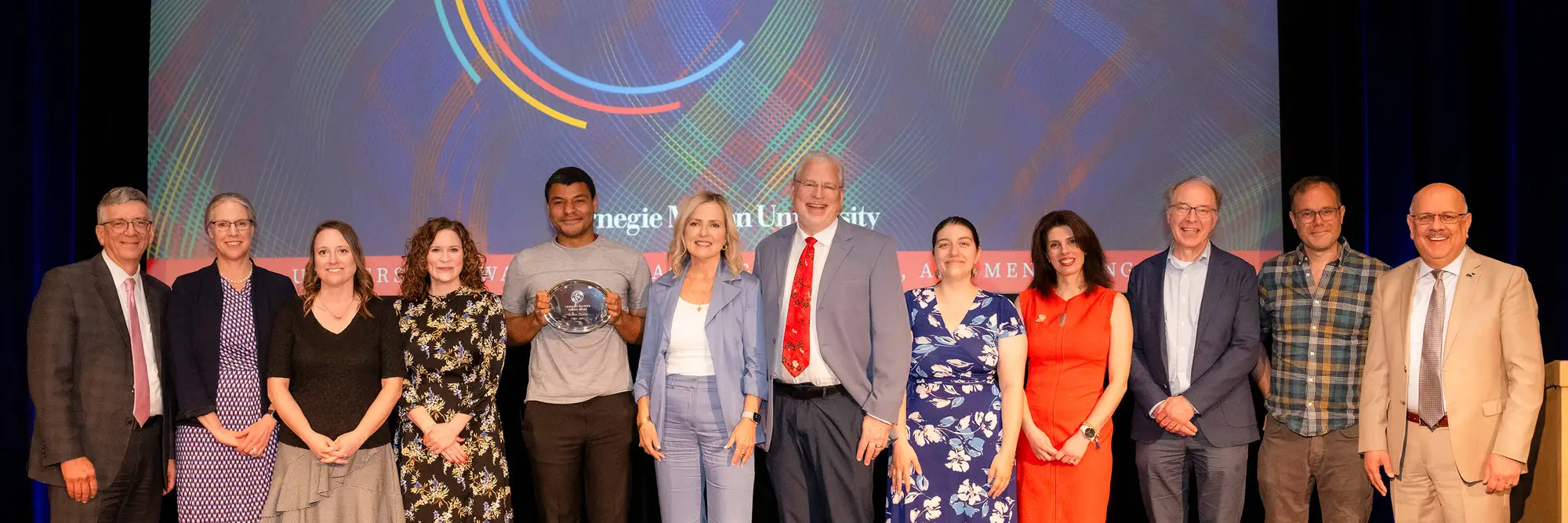
CMU Honors Educational Leaders Across Campus
Media Inquiries
Each spring, the Carnegie Mellon University community gathers for the annual Celebration of Education Awards(opens in new window), which honor outstanding contributions in the areas of teaching, mentorship, service and educational innovation. This year’s awards ceremony was held on Thursday, April 24.
The 2025 Celebration of Education Award recipients are:
- Dena Haritos Tsamitis, Robert E. Doherty Award for Sustained Contributions to Excellence in Education
- Larry Heimann, William H. and Frances S. Ryan Award for Meritorious Teaching
- Jennifer Wegner, Award for Outstanding Contributions to Academic Advising and Mentoring
- Manfred Paulini, Barbara Lazarus Award for Graduate Student and Junior Faculty Mentoring
- Kimberly Piatt, Mark Gelfand Service Award for Educational Outreach
- Chris Harrison, Teaching Innovation Award
- Maria Tomprou, Teaching Innovation Award
- Nicole Tanquary, Graduate Student Teaching Award
- Byron Daniel, Graduate Student Service Award
Additional College Teaching Awards(opens in new window) honor exemplary teaching by faculty members within the seven schools and colleges at CMU. Each college selects their own recipient(s) based on specific criteria and they are chosen throughout the academic year, depending on the college's award cycle. See the 2024-2025 awardees(opens in new window).
Robert E. Doherty Award for Sustained Contributions to Excellence in Education
Dena Haritos Tsamitis
Barbara Lazarus Professor in Information Networking and Director of the Information Networking Institute, College of Engineering
Celebrated for her innovative approach to graduate education, Dena Haritos Tsamitis(opens in new window) of the Information Networking Institute(opens in new window) (INI) has blazed a unique trail at Carnegie Mellon. She has spent 25 years advancing interdisciplinary education, while building a close-knit community of alumni, faculty, campus partners and industry supporters that has strengthened the INI.
"Her dedication to advancing information networking and security education, promoting global programs, and fostering partnerships has left an indelible mark on the university and the rest of the world,” wrote Pradeep Khosla, former INI director and dean of the College of Engineering, who is currently the chancellor at UC San Diego.
Haritos Tsamitis forged the relationship with Athens Information Technology (AIT) to establish CMU’s first global program in 2002: the Master of Science in Information Networking in Greece. One year later, she launched one of the country’s first graduate-level information security degrees in response to the need for a skilled federal cybersecurity workforce in the wake of 9/11. She later built upon the global programs paradigm to develop CMU’s first bicoastal degree programs(opens in new window), where students divide their time between Pittsburgh and Silicon Valley, gaining valuable experiences in both locations.
“For decades she has shaped the minds and careers of master's students in a way that has resonated throughout the world, and built a department that is the envy of many others,” wrote David Brumley(opens in new window), professor of Electrical and Computer Engineering(opens in new window) (ECE).
Haritos Tsamitis has continued to advance cybersecurity education. The M.S. in Information Security(opens in new window) has earned national recognition, currently ranked the top cybersecurity graduate degree by Fortune. Haritos Tsamitis also leads efforts to maintain CMU’s designations as a National Center of Academic Excellence in Cybersecurity (NCAE-C) from the National Science Foundation (NSF). These designations certify the university’s strength in cybersecurity education and research and have allowed the INI to secure over $28 million to support cybersecurity scholarships and outreach initiatives.
Haritos Tsamitis' impact goes beyond the curriculum — through integrating holistic student support and a deep commitment to inclusion throughout the entire organization, she has created a welcoming culture. Her efforts reverberate throughout the INI and echo in the actions of alumni, students, faculty and staff alike. In 2012, she received the Barbara Lazarus Award for Graduate Student and Junior Faculty Mentoring; five years later, she was the first recipient of the endowed Barbara Lazarus Professorship in Information Networking.
“Her vision of integrating technical expertise with leadership skills prepared me to face the challenges of large corporations,” wrote INI alum Tyelisa Shields, who graduated with a master’s degree in science in information technology-information security in 2010 and contributed a letter of support to Haritos Tsamitis’ nomination. “Her mentorship instilled in me the ability to approach challenges with innovation, resilience and a focus on impactful solutions."
— Evan Lybrand
William H. and Frances S. Ryan Award for Meritorious Teaching
Larry Heimann
Teaching Professor of Information Systems, Dietrich College of Humanities and Social Sciences
Larry Heimann(opens in new window) — “Prof H” to his students — has been an integral member of the Information Systems(opens in new window) (IS) program’s faculty since its founding in 2000. He’s widely known for the personal connections he develops with his students.
“Larry’s ability to remember students’ names, even in large lectures, is impressive. He creates an environment where even the shyest are comfortable contributing, often punctuated with his trademark fist bumps for students who correctly solve problems,” wrote IS faculty and staff members Houda Bouamor, Gary DiLisio, Joseph Mertz and Jeria Quesenberry in their nomination.
Heimann has taught nearly every core course in the IS curriculum, developed more than 11 popular electives and advised over 125 student projects. In addition, he’s taught at both the Pittsburgh and Qatar campuses.
“By walking us through code, writing it alongside us and using live examples to illustrate complex theories, he not only made challenging concepts easy to understand but also created an inclusive learning environment. This approach supported students of all skill levels, ensuring that everyone could follow along and participate actively,” said Fatou Gueye, a junior IS major at Carnegie Mellon University in Qatar(opens in new window).
In Application Design and Development, one of the most challenging courses in the major, Heimann employs creative techniques such as role-playing software components and using metaphors to demystify complex concepts. Students often cite these moments as transformative for understanding software engineering principles.
Heimann also breaks down semester-long projects into manageable phases, provides detailed feedback within 24 hours, and offers strategies to prevent challenges from snowballing.
“Larry’s open-door policy is no exaggeration. He consistently makes himself available to students and colleagues, often arriving early or staying late to accommodate their needs,” said Sara Moussawi, associate teaching professor in the IS program.
Heimann continuously revises his courses so they are informed by industry trends and feedback from alumni. Collaborating with University Advancement, he creates a bridge between students and industry professionals, welcoming alumni back into the classroom as guest lecturers, panelists and project mentors.
Jonathan Lindstrom, a senior IS major, teaching assistant and member of the diving team, said Heimann also is the type of faculty member who deeply cares about his students’ lives.
“When I was experiencing an athletics injury and had to miss class for appointments, he didn’t express concern about me missing class but expressed concern for my health and asked if there was anything he could do to support me,” Lindstrom said.
Heimann and his wife open their home on Thanksgiving for students who might not have a place to celebrate. He also makes a concerted effort to help students secure internships and jobs.
In addition to the Ryan Award, Heimann has received an Outstanding Professor Certificate from the CMU chapter of the National Society of Collegiate Scholars (2002), the Andrew Carnegie Society Award of Merit for Teaching (2006) and the Dietrich College’s Elliott Dunlap Smith Award for Distinguished Teaching and Educational Service (2007).
— Abby Simmons
Award for Outstanding Contributions to Academic Advising and Mentoring
Jennifer Wegner
Assistant Dean of Undergraduate Programs, Tepper School of Business
Asking anyone at the Tepper School of Business(opens in new window) who’s made a lasting impact on students’ academic journeys almost guarantees hearing one name: Jennifer Wegner(opens in new window). Since joining Tepper in 2017, she’s completely reshaped what advising looks like — and more importantly, what it feels like for students.
“Throughout my time at CMU, I have always felt more confident knowing I have Jennifer to reach out to if I need. From letters of recommendations and internship advice to dropping/adding courses and overloading, Jennifer has always been eager to help. Her enthusiasm for students' futures allows students to feel confident in themselves. I am grateful for the way Jennifer has been able to impact my education, my attitude and my professional path,” explained junior business administration(opens in new window) student Caitlyn McCready.
Wegner didn’t just tweak the system — she reinvented it. When she arrived, advising was more about checking boxes and telling students what to do. She believed students deserved more than a list of requirements. She built a model that helps them explore their interests, take ownership of their education and grow into confident decision-makers. She meets students where they are and helps them figure out where they want to go — and how to get there.
As assistant dean for undergraduate programs, Wegner leads a team of six academic advisers and personally advises around 100 Tartan Scholars(opens in new window) and business administration majors, taking the time to understand their individual goals and challenges. And it’s not just about academics — she encourages students to try new things, take risks and build a college experience that’s meaningful and uniquely their own.
Her influence doesn’t stop with students. Wegner has brought a real sense of structure, collaboration and purpose to the advising team. She introduced regular one-on-ones, staff retreats and shared advising philosophies so the team could better support each other and their students. She’s created an environment where advisers can grow, share ideas and feel connected to a common mission.
“Jennifer brings heart, strategy and a deep sense of purpose to everything she does," said Isabelle Bajeux-Besnainou(opens in new window), dean of the Tepper School and Richard P. Simmons Professor of Finance. "She has built systems that support success at scale while never losing sight of the individual student. Her innovative leadership has elevated our advising practices and shaped a new standard across the university. We are proud to have her at the Tepper School and even prouder to celebrate her as a model of excellence in higher education.”
Wegner is also helping shape advising across the university. She’s involved in key university committees focused on student retention, academic policies and process improvement. Her work has led to real changes that make things better for both students and staff across CMU.
Wegner’s impact is wide-reaching, but what stands out most is how deeply she cares — about students, about her team and about making the university a place where people can thrive. She’s thoughtful, strategic and genuinely invested in helping students and colleagues alike navigate, grow and shine.
— Leah Schmidt and Katelyn McNally
Barbara Lazarus Award for Graduate Student and Junior Faculty Mentoring
Manfred Paulini
Professor of Physics and Associate Dean for Research, Mellon College of Science
Throughout his career, Manfred Paulini(opens in new window) has fostered a welcoming and nurturing environment for graduate students and junior faculty in the Department of Physics(opens in new window) and the Mellon College of Science(opens in new window) (MCS).
“Manfred has fundamentally transformed our graduate program by implementing countless measures — some big, some small — that together create a supportive and welcoming environment in which our graduate students can flourish,” said Markus Deserno(opens in new window), professor and director of graduate studies in the Department of Physics.
Since joining Carnegie Mellon in 2000, Paulini has advised six postdoctoral fellows and 17 Ph.D. students, and mentored young faculty in the High Energy Group.
As director of the graduate program for the Department of Physics from 2008 to 2017, he significantly enhanced the student experience. He developed a rubric for grading in graduate research courses, instituted town halls for students to share their perspectives, and advised all physics graduate students in their first years. He regularly hosted events that brought students and faculty together.
As the associate dean for faculty and graduate affairs for the Mellon College of Science from 2017 to 2023, Paulini initiated the MCS Hooding Ceremony three years ago and developed new academic opportunities for graduate students, including spearheading the development of the M.S. in Data Analytics(opens in new window) program, which he now directs.
In addition, he initiated the Graduate Student Travel Grant Supplement Program, ran professional development programs for graduate students and began a new faculty orientation for MCS.
As an experimental particle physicist, Paulini has spent decades mentoring others. The university’s particle physics group grew significantly in the past few years through hires of junior faculty and postdoctoral fellows, and graduate student recruitment.
Paulini also demonstrates a deep and ongoing commitment to helping others move forward in their careers.
His mentorship has helped craft the careers of researchers in the High Energy Group, where Paulini’s unwavering support has helped advance new machine learning techniques, increased the number of award nominations and supported researchers pursuing opportunities for advancement.
“As a senior colleague, Manfred is great to work with,” said Assistant Professor Valentina Dutta(opens in new window). “He has advocated for me to gain visibility and recognition in different ways, which include putting my name forward for leadership positions within the CMS (Compact Muon Solenoid) collaboration when I have sought them.”
— Heidi Opdyke
Mark Gelfand Service Award for Educational Outreach
Kimberly Piatt
Director of Experiential Learning, Dietrich College of Humanities and Social Sciences
A tireless advocate for student success, Kim Piatt(opens in new window) has transformed the landscape of experiential learning at the Dietrich College of Humanities and Social Sciences(opens in new window). She leads the Pittsburgh Summer Internship Program(opens in new window) (PSIP), a flagship initiative that places students in hands-on internships with nonprofits, startups and community organizations across Pittsburgh. Under her guidance, the program has grown from 24 students in 2018 to 61 in 2024, impacting more than 110 local organizations and empowering over 360 students.
But Piatt’s impact goes beyond placement logistics. She designs reflective programming that encourages students to explore their own growth while deepening their understanding of Pittsburgh’s social and economic challenges. Nearly all participants report increased self-awareness, and over 70 percent leave with a stronger grasp of local issues. One student shared, “This summer, I learned how inclusive community engagement strengthens nonprofits. That insight is shaping my future.”
Piatt also developed and leads the Dietrich Community Engagement Fellowship(opens in new window) (DCEF), a rigorous program that guides students through coursework on justice and community partnership. In addition to directing and teaching, she mentors students individually, ensuring their projects are responsive, sustainable and grounded in respect for the communities they serve.
Piatt’s leadership extends beyond individual programs. In 2023, she spearheaded a policy requiring all Dietrich College students to complete a reflective experiential learning component — ensuring every student connects their academic work to the real world. She also represents Dietrich in university-wide civic engagement networks, helping embed civic responsibility across campus.
Known for her humor, warmth and deep sense of purpose, Piatt empowers students to see themselves as change-makers. As one fellow described, “Kim doesn’t just teach community engagement — she lives it.”
Through her vision and dedication, Piatt has not only shaped programs but changed lives — making Carnegie Mellon and the Pittsburgh community, more connected, inclusive and inspired.
— Stefanie Johndrow
Teaching Innovation Award
Chris Harrison
Associate Professor, Human-Computer Interaction Institute, School of Computer Science
Since joining CMU in 2014, Chris Harrison(opens in new window) has led the redevelopment of the Human-Computer Interaction Institute(opens in new window) (HCII) course Designing Human-Centered Software, introducing a range of innovative features to make the material more engaging, hands-on and reflective of real-world challenges. Among the most effective additions Harrison has made is a series of design assignments known as “Bakeoffs,” which have become a defining feature of the course and a favorite among students.
“Professor Harrison always brings new, interesting ways of connecting concepts that bring insights you would have never thought about,” said Samuel Parks, an undergraduate student minoring in human-computer interaction.
First introduced in 2015, Bakeoffs are short, open-ended challenges that allow student teams to develop solutions to a shared problem starting with a base design and scaffold code that Harrison provides. Each challenge focuses on a measurable goal — such as improving interaction speed or text input performance — and culminates in a class-wide, real-time evaluation event featuring a live leaderboard.
“Bakeoffs function as large, real-time user studies,” Harrison said. “Students act as both participants and system designers, and the event gives them a rare opportunity to see how their ideas hold up against others who started from the same point but took a different approach.”
Throughout the assignment, students are required to document their ideation, implementation and evaluation process in video submissions, which serve as the primary basis for grading — not leaderboard performance. Harrison also randomizes teams for each Bakeoff and incorporates peer evaluations to support accountability and collaborative learning.
“The Bakeoffs are a unique opportunity to learn, safely fail and succeed in a sandboxed environment that fosters learning, creativity and problem solving without getting lost in the process,” said HCII Assistant Professor David Lindlbauer(opens in new window). “Students learn from the successes, and mistakes, of themselves and others, and the positive nature of the projects allows them to push their own personal boundaries.”
The course’s unique structure and experiential learning model have contributed to its rising popularity, prompting the department to scale it to five independently taught sections in fall 2025 — and making it one of the most in-demand courses HCII offers.
“Students significantly sharpen their skills as designers, iterators and evaluators throughout the semester,” Harrison said. “You can see the quality of their work improve across Bakeoffs, and students recognize it in themselves, which reinforces what we’re teaching.”
To celebrate Bakeoff successes, Harrison also creates and awards themed trophies — handmade in his lab — that have become a lighthearted but memorable part of the course.
— Adam Kohlhaas
Teaching Innovation Award
Maria Tomprou
Assistant Teaching Professor of Organizational Behavior and Theory, Tepper School of Business
Maria Tomprou(opens in new window) created a simple but powerful classroom tool called Unhide — an exercise that helps students recognize each other’s contributions during group work.
“Dr. Tomprou’s work exemplifies the spirit of teaching innovation — bringing thoughtful, research-based solutions to bear on persistent classroom challenges,” said John Gasper(opens in new window), associate teaching professor of economics. “Her ability to blend creativity with inclusivity and student-centered practices makes her a deserving recipient of this award.”
Group projects are a big part of learning in business school, but they don’t always feel fair. Some students end up doing most of the work, while others may not pull their weight. And when things go wrong, students often don’t know how to speak up — especially if they’re worried about being seen as difficult, or if they come from backgrounds where standing out might come with extra risks. Tomprou saw this problem and found a new way to approach it.
Instead of focusing on what’s not working in a group, Unhide encourages students to highlight the classmates who are quietly making a difference — the “hidden diamonds.” Maybe it’s someone who keeps the group on track, brings great ideas to the table or supports others in a thoughtful way. With Unhide, students can nominate their peers for these kinds of positive actions. It’s a small shift that makes a big difference.
“Maria’s Unhide initiative is a shining example of how innovative teaching can transform the student experience,” said Isabelle Bajeux-Besnainou(opens in new window), dean and Richard P. Simmons Professor of Finance. “By helping students recognize and elevate one another’s contributions, she’s fostering a culture of collaboration and mutual respect. This is exactly the kind of impact we strive for in our classrooms, where every voice has value, and every student has the chance to thrive.”
Not only does this make students feel seen and appreciated, but it also helps instructors understand who’s contributing in group settings. The best part? Students want to participate in this kind of feedback, because it feels good to lift each other up.
Tomprou’s idea is already inspiring other faculty members who are eager to bring Unhide into their classrooms. It’s a great example of how a creative, student-centered idea can lead to a more supportive, fair, and engaging learning environment. Thanks to her innovation, students now have a better way to work together — and to celebrate the teammates who make that possible.
— Leah Schmidt and Katelyn McNally
Graduate Student Teaching Award
Nicole Tanquary
Doctoral Student, Department of English, Dietrich College of Humanities and Social Sciences
Nicole Tanquary(opens in new window)’s research centers on feminist rhetorics, political discourse and studies of public accountability, among other topics. In spring 2025, she taught the self-designed interpretation and argument course, Reckoning with Me Too, in which students studied the history and impact of the #MeToo movement through a rhetorical lens.
“Nicole is deeply reflective about their own teaching and practice, which shows in their admirable course design,” said Courtney Novosat(opens in new window), senior lecturer in the Department of English(opens in new window).
Tanquary’s teaching philosophy is centered in the concept of Universal Design, which focuses on delivering course content in a variety of formats in order to meet the needs of all learners, including those with physical or learning disabilities. Tanquary takes this a step further, creating lesson plans that take into account factors such as cultural background and mental health in addition to ability.
“Difference among our students is enriching to our classrooms,” Tanquary said. “As an instructor, my goal is to ensure that all of my students have access to a shared sense of empowerment as they learn to write in academia.”
Tanquary is also known for kindness and consideration.
“Nicole brings a unique combination of warmth, creativity and patience to their teaching,” said Julie Pal-Agrawal(opens in new window), a lecturer in writing and communication. “She genuinely cares about the well-being and success of her students, and she fosters an environment of trust and mutual respect in their classroom.”
Tanquary’s students echo this sentiment. Design and human-computer interaction sophomore Viviana Staicu explained that Tanquary’s teaching made her more at ease with the writing process. “Her written feedback alone helped me learn and feel more confident in my writing abilities — it felt like I had a personal tutor.”
Kevin Xu, a sophomore in design and human-computer interaction, said, “She always goes out of the way for her students. At the end of class, she would stay behind to talk to students and answer any questions. I’m very grateful to have had her as my teacher!”
— Emily Nagin
Graduate Student Service Award
Byron Daniel
Doctoral Student, Department of Physics, Mellon College of Science
Byron Daniel is recognized for his dedication to his fellow graduate students in the Department of Physics(opens in new window) and his contributions to the broader Carnegie Mellon community.
One of his major efforts was investigating student group funding to attempt to make the funding more equitable. Using statistical and data analysis techniques he had learned from his research, he shared the problems with the current model and suggested new ways that funding could be reallocated in the future.
“It was one of the first times I really got to use a lot of the skills I developed in university and in research in a context that wasn’t just science,” Daniel said. “It was really rewarding.”
Daniel is in his final year of his Ph.D., where he has been investigating neutrinos, small particles that are part of the Standard Model of Physics and that rarely interact with matter. He has mentored undergraduate students and more junior graduate students in the Parno group. Outside of his research, he has served as a vice president of the Graduate Student Assembly(opens in new window), the first outreach teaching assistant for the Department of Physics, a member of the University Leadership Student Advisory Council(opens in new window) and a member of the Counseling and Psychological Services Student Advisory Board(opens in new window), among other leadership and service work.
“Byron represents the best of CMU’s service ethos. He has devoted substantial time, effort and creativity to improving the experience of graduate students at all levels,” said Diana Parno(opens in new window), Falco-DeBenedetti Associate Professor of Physics and Daniel’s adviser.
“He is an outstanding citizen of the department, college and university who consistently advocates for the needs and interests of the student population. He conscientiously seeks to improve any group of which he is a member. I can think of no more qualified student for the Graduate Student Service Award,” said Rachel Mandelbaum(opens in new window), professor and interim head of the Department of Physics.
— Kirsten Heuring
